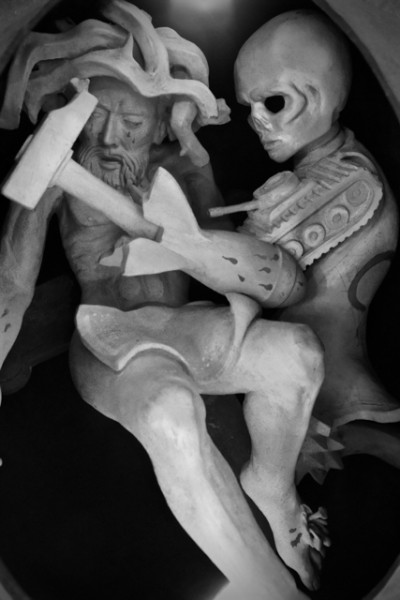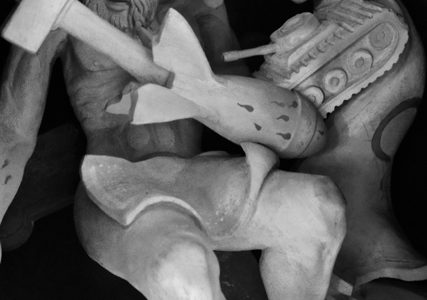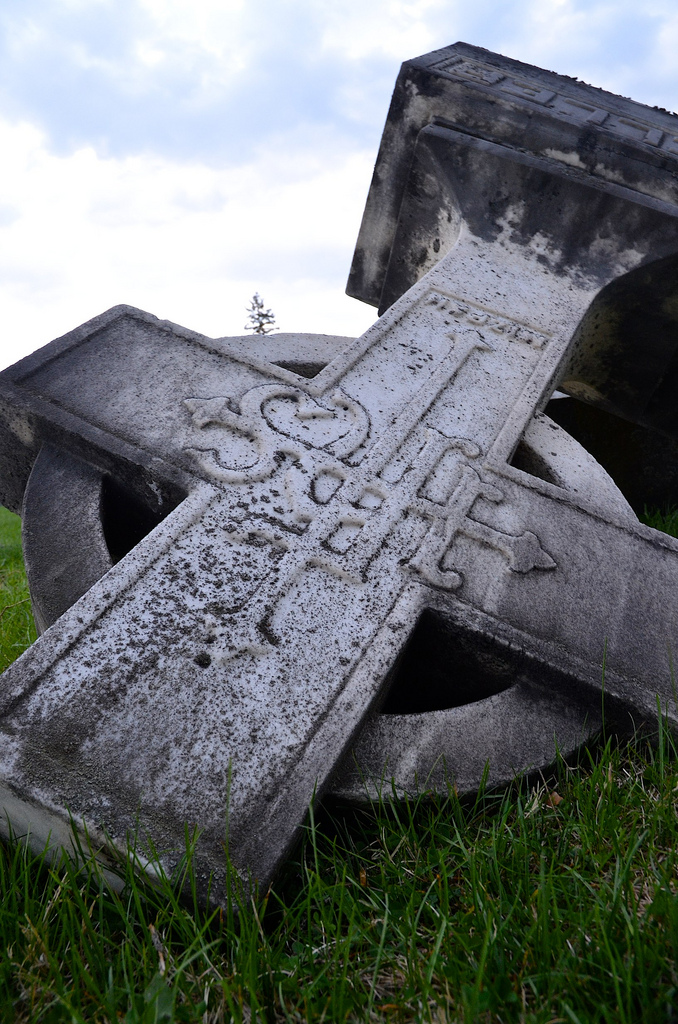This sermon was preached at St. Bartholomew’s, Nashville, TN on Sunday, November 13, 2016. The previous week Donald J. Trump had been elected as President of the United States.
Proper 28 (33) (November 13, 2016)
- First reading and Psalm
- Isaiah 65:17-25
- 98
- Second reading
- 2 Thessalonians 3:6-13
- Gospel
- Luke 21:5-19
Karl Marx famously said, [History] “repeats itself, first as tragedy, second as farce.”[1] Someone else once said, tragedy is when it happens to me, farce [comedy] is when it happens to you.
History is a funny thing. The word “history” doesn’t simply mean that which was occurred in the past. Technically it is from Greek ἱστορία, meaning “inquiry, knowledge acquired by investigation.” That investigation of the past was usually through written documents and so we referred to time before writing as “pre-history.” So, history is what we know about particular events in a particular period of time and place through the investigation of extant sources. In the last few hundred years the creation of the disciplines of archeology, linguistics, and sociology have provided us with far more sources than just documents and helped to flesh out and complicate our view of the past. Today we have so much data one can be forgiven for thinking that “history” needs to be written at all. Simply look at the evidence for yourself.

But when you start to think about it, history is still weird because we are constantly making it and, as Martin Luther King, Jr. pointed out, being made by it. When momentous things occur we often say that we are living in “historic times.” This past Monday, people said that the next day would be an “historic election” as if other elections were not. Of course, it was an historic election since every presidential election is historic: once it has occurred it will be in the past and will be studied for years to come. One of the reasons to study history is so that we can better understand our present and perhaps even make some educated guesses about our future. For example, the history of the United States presidential elections tells us that while this was the most vitriolic election in our memory, it is not the most ever in US history. And that while many fear a Trump presidency and others view it as the great hope for our nation’s future, our history tells us that things are rarely as bad or as good as we think.
Of course, there is also the old saw that “it is the victors who write history” and so sometimes it is hard to really know what happened in the past. In fact, Winston Churchill understood it so well that he said, “History will be kind to me for I intend to write it.” Today we have many people seeking to understand and interpret our immediate past. It is not only the victors who are writing now. Personally, I have set that aside for the time being for two primary reasons: (1) there is too much emotion in it now, mine and others, which is why (2) history is best written from a discrete distance. And anyway, life is not lived in history, it is lived in the present.
As seems to happen so often, even though our lectionary was determined decades ago, today’s Scripture readings are directly relevant for this time in our own history. They too must be placed within their context, but what Isaiah and Jesus have in common this morning is that they call us to take a broader view of history. A view of history that is, in fact, outside of time, at least, outside of our time.
But let’s consider some history and the context of the words of Isaiah. The prophet is speaking to the people of Judah who had been exiled to the lands of Babylon. For decades now they had been living in Mesopotamia, fulfilling Jeremiah’s words we heard a few weeks ago, that they should settle down, build homes and families, because God was allowing the land of Israel and her people a time of enforced rest. The children of Judah, now adults, had known no life other than that of life in Mesopotamia. Jerusalem and the LORD’s temple were nothing but stories to them. And the LORD now speaks to them and declares,
65:17 I am about to create new heavens and a new earth; the former things shall not be remembered or come to mind. 18 But be glad and rejoice forever in what I am creating; for I am about to create Jerusalem as a joy, and its people as a delight.
This is part of a larger declaration in Isaiah about the coming of Cyrus the Great who destroyed the Babylonians and allowed the Jews to return to Judea to rebuild Jerusalem and the Temple. But Isaiah speaks not only of that immediate restoration, since the Jews now know that it is fleeting. They have learned through tragic experience that the walls of Jerusalem can be breached by a mighty army and the Temple itself can be pulled down. No, God also declares that the ultimate salvation of Israel will come at the end of all history. In that new and eternal Jerusalem God says,
19 I will rejoice [in Jerusalem],
and delight in my people;
no more shall the sound of weeping be heard in it,
or the cry of distress.
20 No more shall there be in it
an infant that lives but a few days,
or an old person who does not live out a lifetime;
The message of the book of Isaiah is not an easy one to hear, it is long (66 chapters) and complicated. It opens with an accusation by God against his people, a “sinful nation, people laden with iniquity.” God punished his people, sent them into exile, and yet continued to work for them and with them, even through some of the most despotic people history has ever seen. Shalmaneser V, Nebuchadnezzar, Cyrus the Great, Darius, these were are all brutal emperors and conquerors. Yet still God was present in their reigns to both punish and restore his people.
It is the message also of our own exile. It is long and complicated and not easy to bear. Yet God promises us that his view of history, a view from above, not within, reveals that there will ultimately be restoration, justice, and lasting peace. But in the meantime…
Luke 21:10b “Nation will rise against nation, and kingdom against kingdom; 11 there will be great earthquakes, and in various places famines and plagues; and there will be dreadful portents and great signs from heaven.”
We live in a world that should grieve us. In fact, if there is one immutable truth that history teaches us it is that this world will disappoint us. Even as we live in arguably the greatest nation in history there is still hunger and homelessness, there are children and partners being abused, there is racism and sexism, bullying, greed, selfishness, and just simple wickedness. That doesn’t begin to take into account all the sorts of evils that are perpetuated in areas of the world that do not have our “freedoms and protections.”
In the first century, Jesus lived in a region under Roman authority and Jerusalem was run by a combination of competing Jewish interests. There were those who worked directly for the Romans collecting taxes and keeping order like Zacchaeus, there were those who were in the priesthood and controlled access to the Temple and religious life and duties, and there were the Herodian rulers who were vassals of Rome but hardly model Jews.
To offer that historical perspective again, aside from a very brief period in the second and first centuries BCE, the region around Jerusalem had not been under sole Jewish control for 600 years! This brief period of “home rule” was under the leadership of the Maccabees, who reigned for less than 100 years (140-63 BCE). (Further reason to read the Apocrypha!) In fact, it would not be until 1947 with the establishment of the modern nation of Israel that this region would again be a Jewish nation-state.
Jesus speaks of nations rising against nations, he says “you will be betrayed even by parents and brothers, by relatives and friends.” Neighbor will rise against neighbor, brother against brother, parent against child. Dare I make it obvious? Republican against Democrat. The history of humanity is the history of selfishness and greed. Why did Cain kill Abel? Do you remember?
Gen. 4:3 In the course of time Cain brought to the LORD an offering of the fruit of the ground, 4 and Abel for his part brought of the firstlings of his flock, their fat portions. And the LORD had regard for Abel and his offering, 5 but for Cain and his offering he had no regard. So Cain was very angry, and his countenance fell.
The Bible doesn’t tell us why God didn’t receive Cain’s sacrifice, we can guess, perhaps he hadn’t really offered the best bits of his crops, perhaps his heart wasn’t really in it. But God did warn Cain. He saw that Cain was bummed that he wasn’t the special, favored child and so God said,
“Why are you angry, and why has your countenance fallen? 7 If you do well, will you not be accepted? And if you do not do well, sin is lurking at the door; its desire is for you, but you must master it.”
We know the result. Cain took out his rage and disappointment with himself on his brother and the cycle of sin continued to turn. And when God asked where Abel was, Cain’s smart-alecky reply “Am I my brother’s keeper?” was intended to invoke the negative response. “No Cain, I don’t expect you to protect your brother.” Yet that is exactly what God expected.
“We don’t make history, history makes us,” said Dr. Martin Luther King, Jr. He is right, of course. We don’t choose what era or economy we are born into, what race or gender, nation or culture. And often, very often, we don’t have a choice about who the Romans and the High Priests are that rule above us. But we are able to choose how we respond to the actions of those around us. We can push back against the history that has preceded us and as we are making our own, we can choose what kind of history it is that we are making.
The human named Joshua and the people who hung out with him did not have many choices. They were mostly working class folks who had the burdens you would expect: working to feed their families, trying to be good people, and wondering if and praying that things would get better. They were fed up with the Romans, the Rabbis, and the Priests.
But that day they were feeling fairly proud, feeling good about their expression of devotion to God. They were admiring the beauty and craftsmanship of the Temple that was dedicated to the Lord their God. “As for these things that you see, [said Jesus] the days will come when not one stone will be left upon another; all will be thrown down” (Luke 21:6).
Jesus is reminding them and us that the things that we have built, not just Temples and churches, but institutions and empires, will come and go. We need to have the longer view of history that realizes that this world is fleeting. No matter how strong, sacred, and enduring it seems to us, it will all come down and be replaced with the perfected heaven and earth. While this might be depressing to some, to think that all we have accomplished will fade away, the message is of hope and promise. Not just the fact that we and the world shall be restored, reunited with God and all the blessed saints who have gone before, but that there purpose as well to our time here, now.
Because in the meantime we are still here, still in exile, still hearing of wars and rumors of wars. The Lord told the Jews living in Babylon to “seek the welfare of the city where I have sent you into exile, and pray to the LORD on its behalf, for in its welfare you will find your welfare” (Jer. 29:7). We are to continue to work for the welfare of our community, even if we feel that it is a place of persecution and exile, for that is what Babylon was to the Jews.
And Jesus tells us that in this time we have much to do. These very times of trial and persecution that we wish to avoid, Jesus says, “will give [us] an opportunity to testify.” (Luke 21:13) What will we testify? How will we testify?
We are to be the witnesses to the love and justice of God through our daily lives. How we choose to respond to the powers around us is our testimony. Will they know we are Christians by our love? We will be living representatives of God’s grace and love, his forgiveness and mercy in this world? Will we also be willing to stand up as witnesses against the wickedness of this world?
The prophet Isaiah not only proclaimed the coming of God’s kingdom, he also consistently challenged Israel to live up to God’s Law. This was the role of the prophets that has been inherited by the church, to be the conscience of our community, to speak against injustice, to work for peace in this time, even as we declare that our ultimate peace comes only through reconciliation with Christ.
For some this past week has been a time for mourning and sadness. Others see it as a great hope for our nation. Prophet and Messiah, Isaiah and Jesus, remind us that the Church must stand outside of government and politics, we must stand for the eternal message and truth of the Gospel. [mfn]Which is not to say that Christians cannot or should not be involved in government or politics, just that the church must not become implicit or too enamored with it. The church’s role is as prophet and critic, holding government accountable.[/mfn] Jesus is the savior of the world and when we accept that truth in our own lives not only are we transformed but the world is transformed through us.
Yes, there is still so much work to be done in our world and that will always be the case. But this history will end. And its end with a new creation.
Almighty Father, who gave your only Son to die for our sins and to rise for our justification: Give us grace so to put away the leaven of malice and wickedness, that we may always serve you in pureness of living and truth; through Jesus Christ your Son our Lord, who lives and reigns with you and the Holy Spirit, one God, now and for ever.
Amen. ✠
[1] Der 18te Brumaire des Louis Napoleon.





